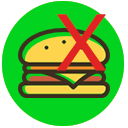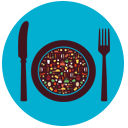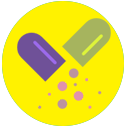Blood sugar level over 400 mg/dl
- Home
- blood sugar levels
- level over 400 mg/dl
Your last measurement found blood sugar level over 400 mg/dl.
What does it mean??
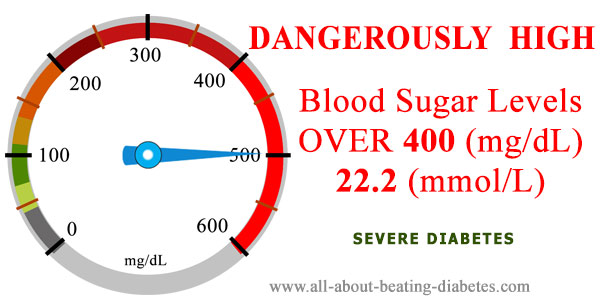
Blood sugar level over 400mg/dl is classified as severe diabetes or badly controlled diabetes. It is a condition which seeks immediate treatment.
When your blood sugar was tested...
What causes fasting blood sugar level
over 400 mg/dl?
There are many of my patients complaining that when they measure blood levels, they can found fasting blood sugar level over 400 mg/dl.
They express their worries and fear of suffering from possible severe diabetes complications. And they are right.
When fasting, the body triggers the production of Glucagon, which is a hormone that induces the glycogen metabolism. The metabolism of glycogen results in the unleashes of the sugar in the bloodstream.
This way, the blood sugar level, in normal people, stays within the normal ranges.
But, in diabetic people, one or more of the aforementioned mechanisms is impaired, and so the blood sugar level is higher than normal.
Most of the times, blood sugar level over 400 mg/dl is due to uncontrolled diabetes, in people who are unaware that suffer from diabetes.
But, blood glucose level over 400 mg/dl can also be due to extreme stress or intake of certain medications.
Why did I get blood sugar level over 400 mg/dl after eating?
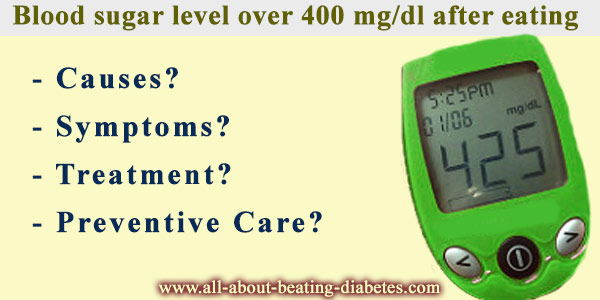
When eating, we take different amounts of carbohydrates (accordingly to what we eat). These carbohydrates cause a hyperglycemic peak, which is soon neutralized by the release of insulin from the pancreas.
In diabetic people, the insulin production is insufficient, or cells are insensible to insulin. In diabetic people, the aforementioned mechanism is impaired, and the post-prandial hyperglycemia persists.
Glucose builds up in the bloodstream causing complications.
In some cases, blood sugar level over 400 mg/dl may be due to the use of some drugs, such as Thiazines, beta blockers, statins, steroids, antipsychotics, immunosuppressive agents, pentamidine, nicotinic acid etc.
There are three ways one can get increased levels of glucose:
1. due to an increase of insulin resistance, or
2. due to the affection of insulin secretion, or
3. both of them.
Symptoms of dangerously high blood sugar over 400 mg/dl
Blood sugar level over 400 mg/dl is considered severe diabetes and seeks immediate treatment. If the sugar level reaches 500 mg/dl it is considered as a medical emergency. These levels of blood glucose are life-threatening and can cause death.
The most common symptoms of blood sugar level over 400 mg/dl are extreme thirst, frequent and excess amount of urine, fatigue, tiredness, drowsiness, blurred vision, rapid breathing, confusion, tingling and numbness of the feet.
Very high blood sugar levels can result in the development of :
- diabetic ketoacidosis (DKA - happens only in type 1 diabetes, can happen when blood glucose level is over 250 mg/dl) and
- hyperosmolar hyperglycemic state (HHS - usually happens in people over 65 years old who suffer from type 2 diabetes, can happen when blood glucose is over 600 mg/dl).
- DKA symptoms are rapid breathing, fruity breath odor, stomach pain, increase of the heart rate, increased thirst, frequent urination, positive ketones in the urine, permanently brain damage or even death.
- HHS- is a serious complication of type 2 diabetes. When the levels of blood sugar are too high. In this condition, glucose is eliminated with the urine. But, when being eliminated, it draws high amounts of water causing severe dehydration.
HHY’s symptoms include extreme thirst, excess amounts of urine, fatigue, fever, warm, dry skin, vision loss, hallucinations, convulsions, very dry mouth.
- DKA and HHS can cause permanent brain damage, coma and even death.
In case such high blood glucose levels were caused by using certain drugs, the symptoms may start shortly after taking the drug, or longer after its intake. Sometimes, it takes a few days for the symptoms to appear.
Very high blood sugar levels can result in the development of diabetic ketoacidosis (DKA - happens only in type 1 diabetes, can happen when blood glucose level is over 250 mg/dl) and hyperosmolar hyperglycemic state (HHS - usually happens in people over 65 years old who suffer from type 2 diabetes, can happen when blood glucose is over 600 mg/dl).
Treatment for Blood sugar level over 400 mg/dl
fasting, after eating, and drug induced
Treatment of blood sugar level above 400 mg/dl is a medical emergency. Immediate hospitalization is a must, especially when blood sugar reaches the level of 500 mg/dl.
Rehydration and fast-acting insulin are the chosen treatment, in order to lower blood glucose levels as soon as possible.
If you think this sudden increase in blood glucose happened after using one of the drugs listed above, then, stop using it and report this side effect to the doctor who prescribed this medication.
If the increased glucose numbers persist even after stopping the med, consult with a doctor. You may need to start an anti-diabetic treatment.
Blood sugar level over 400 mg/dl - Preventive Care
Patients who have experienced blood sugar level over 400 mg/dl should drink plenty of water, check their urine for ketones and talk to their doctor to take precautions in order to prevent a further increase of the blood sugar level.
The lifestyle changes are very important. The following lifestyle changes will help keep blood glucose within the normal range:
1. Eating a healthy diet - this means cutting off fat and caloric foods, and eating fiber-rich foods instead, such as legumes, whole grain products, all kind of vegetables and fruits.
2. Weight loss - Losing weight lowers your glucose levels. A loss of only 7 % of your total body weight significantly decreases glucose levels.
3. Exercising - Exercising not only lowers your glucose levels, but it also improves blood circulation and lowers fats in the bloodstream. Exercise at least 45-60 min every day. Consider brisk walking, bike riding, swimming laps, playing your favorite sport etc. DO NOT exercise if you have ketones in the urine.
4. Quitting smoking and alcohol
Do not use the drugs that cause your glucose levels to rise again. If you must use these drugs, consult with your doctor first. He might come up with a plan to avoid your glucose levels to rise while using this drug.
Written by Dr.Albana Greca Sejdini, Md, MMedSc
Medically reviewed by Dr.Ruden Cakoni, MD, Endocrinologist
Resources:
- Risks for extremely high blood sugar levels.
- Lower blood sugar quickly in an emergency.
- Care for uncontrolled diabetes.
Diabetes complications Questions or Problems? Get Help Here
This is the place where you can ask a question about any aspect of diabetes complications.
It's free and it's easy to do. Just fill in the form below, then click on "Submit Your Question".
